This time last year, I offered a post that intentionally reflected what some friends think of as my basic optimism. I even called the post “An Optimistic Perspective for 2021,” and it was published at https://bit.ly/38346BE.
The post was full of my own optimism, a description I won’t deny. And remembering the post and re-reading it gave me the chance to think lovingly of a dear friend. She is now in her 108th year, and one of her most charming qualities is that she calls herself a “positivist.” She likes to refer to me as her “favorite optimist,” and not to put too fine a point on it, I am very pleased when she does that.
I’m a little surprised about what I wrote for my New Year’s Day 2021 post. I thought (and I think we all expected) that by now the COVID-19 epidemic would have run its course, and we would be happily moving forward with our “real” lives again.
But it didn’t happen, did it? And as I think about what I wrote last year, I find I want to re-consider some of what I said then. For one thing, my great inspiration last year was an opinion piece called “Where I Find Hope,” written by former Vice President Al Gore, and his message in that essay still rings true. He did not offer admonitions, and his direction pointed to how we ourselves can prepare for handling what’s in front of us.
In his essay, Gore wrote about what we can accomplish “when taking advantage of the right spirit.” He writes (he is very clear about this): it’s a spirit that “will lead us to where we want to go and need to be,” looking at and understanding the opportunity we have before us.
Gore understands how tough it’s going to be, and he has his own way of phrasing where we can go and what we can do. It’s a path based on hope, just as he says in the title of his essay, and just as Americans have been doing for more than two hundred years.
Here’s how Gore put it:
What lies before us is the opportunity to build a more just and equitable way of life for all humankind. This potential new beginning comes at a rare moment when it may be possible to break the stranglehold of the past over the future, when the trajectory of history might be altered by what we choose to do with a new vision.
Gore made a point of outlining the challenges, and – as we expect when reading what Al Gore has to say – his ultimate focus was, of course, on climate change:
And though the pandemic fills our field of vision at the moment, it is only the most urgent of the multiple crises facing the country and planet, including 40 years of economic stagnation for middle-income families; hyper-inequality of incomes and wealth, with high levels of poverty; horrific structural racism; toxic partisanship; the impending collapse of nuclear arms control agreements; an epistemological crisis undermining the authority of knowledge; recklessly unprincipled behavior by social media companies; and, most dangerous of all, the climate crisis.
 Certainly none of us would disagree, but I wonder if we should not (at least temporarily) re-arrange how we shape our thoughts. Our epidemic is now entering its twentieth month (or twenty-first – I can’t keep track), and there’s no way to get around what we’re facing. Here in New York City there is much concern, for the new COVID-19 surge, now with the Omicron variation, is here and it’s probably going to be with us for a while.
Certainly none of us would disagree, but I wonder if we should not (at least temporarily) re-arrange how we shape our thoughts. Our epidemic is now entering its twentieth month (or twenty-first – I can’t keep track), and there’s no way to get around what we’re facing. Here in New York City there is much concern, for the new COVID-19 surge, now with the Omicron variation, is here and it’s probably going to be with us for a while.
And we’re trying to figure out what to do.
Just last week, in an analysis published in The Times, our Manhattan neighborhood (Murray Hill) came out at the top of the list of the most-impacted and highest-infected areas of the city. The fact that the distinction is shared with another neighborhood just a few blocks away (Gramercy) doesn’t make the story any less scary. And the numbers are there, and we must accept the facts: As of December 31, New York City had 45,384 cases, a 551 percent increase in the 14-day change, with a total of 1,549,341 cases reported (and only 73% of New York City’s residents are fully vaccinated).
And mindfulness, especially in times like the one we’re in now, is not complicated or time-consuming. A common reference simply defines mindfulness as “the practice of purposely bringing one’s attention in the present moment without evaluation, often developed through meditation and/or training.”
If we want to move in that direction, all that is required of us is to listen to what we can learn about COVID-19, ensure that each of us (and the people with whom we spend time) are fully vaccinated, keep washing our hands, and wear those masks we’re getting so tired of! If we’re lucky, we’ll get there, and move into a healthier frame of mind (I say “healthier” purposely). Being mindful, we’ll be able to deal with what is thrown at us.
But there’s more to it than just washing our hands. If we’re going to be mindful of what’s going on in our lives, we’ve also got to be thinking about the attitude that goes along with being mindful. We are citizens of a country trying to deal with the pandemic and the now-more-than 800,000 deaths, and that means we must think about how we’re thinking about the troubles we’re all dealing with.
But don’t we – as a society – have an obligation (as Al Gore put it) to take advantage of what we already have, and “build a more just and equitable way of life for all humankind”?
 We can do that, but we must recognize that we can do it. For me – for the “eternal optimist” that I can’t stop being – my focus last January had more to do with what came after Vice President Gore’s fine essay the previous December. It came during President Biden’s Inauguration ceremony, and it simply required us to listen. The words are there, in the perspective put forward by the young woman I now call “Guy’s Favorite Person” – Amanda Gorman, our country’s first-ever Youth Poet Laureate. In her poem, “The Hill We Climb,” Amanda told us how we can think about post-COVID recovery, inspiring us to achieve what we need to achieve:
We can do that, but we must recognize that we can do it. For me – for the “eternal optimist” that I can’t stop being – my focus last January had more to do with what came after Vice President Gore’s fine essay the previous December. It came during President Biden’s Inauguration ceremony, and it simply required us to listen. The words are there, in the perspective put forward by the young woman I now call “Guy’s Favorite Person” – Amanda Gorman, our country’s first-ever Youth Poet Laureate. In her poem, “The Hill We Climb,” Amanda told us how we can think about post-COVID recovery, inspiring us to achieve what we need to achieve:
The new dawn blooms as we free it
For there is always light,
if only we’re brave enough to see it
If only we’re brave enough to be it.
Further, Ms. Gorman said:
We will not march back to what was
but move to what shall be
I am thankful to Amanda Gorman for sharing her words with us. We all need to hear them.
______________________________________________________________________________________________
A Happy and Prosperous New Year to you and Andrew from all the Williamsons here in the UK. May 2022 be better!